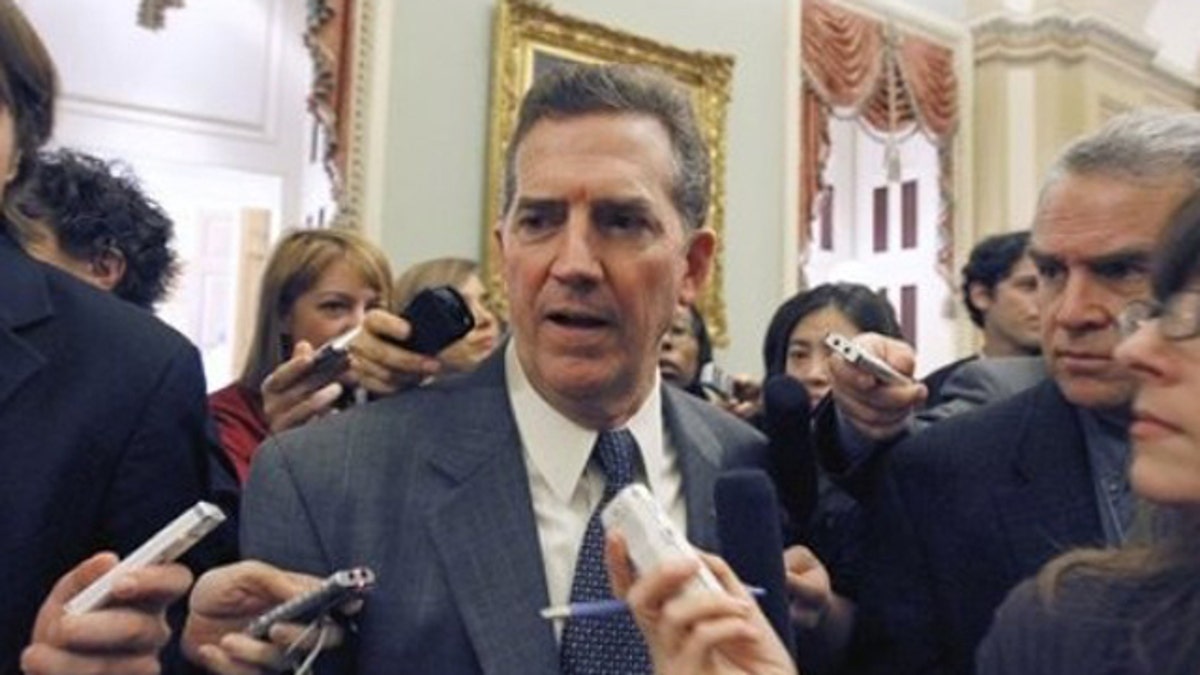Senate Republicans Threaten to Fight NLRB Nominations Over Boeing Complaint
{{#rendered}} {{/rendered}}
In this Nov. 16, 2010 photo, Sen. Jim DeMint talks with reporters on Capitol Hill in Washington. (AP)
A group of Senate Republicans fired off a letter to President Obama Thursday, threatening to “vigorously oppose” a couple of key nominations to the National Labor Relations Board (NLRB) after it issued a complaint that they see as an assault on right-to-work states.
The letter is the latest turn in the battle between the Obama administration and lawmakers from non-union states.
The NLRB has filed a complaint against the Boeing Company for what it calls an "unlawfully motivated" expansion by the airplane builder into the right-to-work state of South Carolina. The complaint has potentially wide-reaching ramifications, not only for Boeing, but for almost all companies seeking to do business in the 22 states presently governed by right-to-work rules.
{{#rendered}} {{/rendered}}Boeing has decided to open a second production facility in Charleston, S.C. for the 787 Dreamliner, the company's fastest selling airliner, with more than 800 planes on order.
But late last month, just as the last beams were being put into place at the Charleston plant, the NLRB filed the complaint which accuses Boeing of choosing South Carolina as an act of discrimination against its labor unions.
In a statement, an NLRB spokesman said, "Boeing decided to locate a particular line of work in a non-union facility to retaliate against union employees who had engaged in legally protected strike activity."
{{#rendered}} {{/rendered}}Since the mid-1970's at least five strikes have been waged against Boeing by its unionized Everett, Washington employees - two of those strikes occurring in the last five years. But Boeing denies the South Carolina move is retaliatory. It points to the hiring of 2,000 employees at its Washington State plant since the move to South Carolina was announced.
Now, members of the largely Republican South Carolina congressional delegation are fighting back against the NLRB complaint. They believe it is a blatantly political maneuver by the Obama administration to shore up its union base.
"It's clearly outside of the authority of this federal government to be threatening and bullying and trying to intimidate companies like Boeing who should have the freedom to locate their plants anywhere they want. It's intimidation," Sen. Jim Demint, R-S.C., said Wednesday from the Senate floor.
{{#rendered}} {{/rendered}}The Obama administration has been largely silent on the NLRB complaint.
"This is an independent agency's enforcement action," a White House official told Fox News. "The White House does not get involved in particular enforcement matters."
But some observers say the White House has been deeply involved in stacking the NLRB with pro-union recess appointees - among them: Craig Becker, the associate general counsel of the Service Employees International Union, and acting NLRB general counsel Lafe Solomon, a career NLRB attorney.
{{#rendered}} {{/rendered}}"It's very important to President Obama because unions and their workers comprise a big piece of the volunteer core of the Democratic Party and a lot of money besides," said Larry Sabato, a political science professor at the University of Virginia. "The stronger unions are, the more workers and the more money they're going to put into Obama's campaign and all the Democratic campaigns."
Republicans in both chambers of Congress have drafted letters to the president calling for the withdrawal of Solomon's nomination as the NLRB's general counsel.
Republicans are also introducing legislation in the Senate that would strengthen right-to-work laws in the 22 states where they presently exist. In their letter to the president, 19 Republican senators said the NLRB’s actions are at odds with Obama’s recent calls to “win the future.”
{{#rendered}} {{/rendered}}“If the NLRB prevails, it will only encourage companies to make their investments in foreign nations, moving jobs and economic growth overseas,” the letter said. “America will not win the future if Washington penalizes workers in states that have discovered winning economic strategies.”
Legislation soon to be introduced in the House would bar the NLRB from using any federal funds to impede Boeing's expansion in South Carolina.
